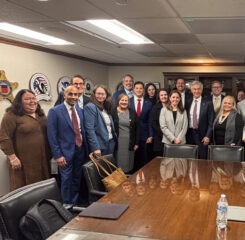CMS Updates COVID-19 Medicare Provider Flexibilities for Home Health and Hospice
On August 18th, 2022, CMS released a blog on a roadmap to the end of the COVID-19 Public Health Emergency. In the blog post, Jonathan Blum, CMS’ Chief Operating Officer and Principal Deputy Administrator reviews the agency’s use of emergency authority waivers, regulations, enforcement discretion, and sub-regulatory guidance which has helped to ensure access to care and give health care providers the flexibilities needed to respond to COVID-19 and help keep people safer.
While the flexibilities will be in place until the end of the Public Health Emergency (PHE), and Secretary Becerra has committed to a 60-day notice prior to the end, CMS is encouraging health care providers to prepare for the end of these flexibilities as soon as possible and to begin moving forward to reestablishing previous health and safety standards and billing practices.
CMS also released fact sheets summarizing the current status of Medicare Blanket waivers and flexibilities by provider type: Home Health: Flexibilities to Fight COVID-19, Hospice: CMS Flexibilities to Fight COVID-19.
We took a deeper look at the home health and hospice fact sheets and found several items to highlight. Please pay close attention to the workforce related timelines. LeadingAge’s Home Health Blanket Waiver Chart and Hospice Blanket Waiver Chart were updated to reflect the newest guidance.
Home Health Updates
Telehealth
- CMS clarifies the required face-to-face encounter for home health can be conducted via telehealth (i.e., 2-way audio-video telecommunications technology that allows for real-time interaction between the physician/allowed practitioner and the patient) when the patient is at home. The face-to-face encounter can be conducted via telehealth irrespective of the COVID-19 PHE; however, the waiver only extends the “originating site” to the patient’s home during the duration of the COVID-19 PHE unless changed by Congress. Currently, Congress has extended the originating site waiver for 151 days after the end of the PHE. A bill has passed the House that would extend it until December 31, 2024.
COVID-19 and Homebound Status
- CMS states in the new fact sheets that it considers a beneficiary homebound when their physician advises them not to leave the home because of a confirmed or suspected COVID-19 diagnosis or if the patient has a condition that makes them more susceptible to contract COVID-19. As a result, if a beneficiary is homebound due to COVID-19 and needs skilled services, an HHA can provide those services under the Medicare Home Health benefit. CMS further states “This is not a change in the definition of homebound and is irrespective of the COVID-19 PHE.” We will follow up with CMS for further information on what documentation is needed to accompany a determination of “homebound” due to COVID-19 status.
Workforce
CMS made a number of clarifications regarding when home health and hospice agencies must come into compliance with waivers regarding workforce. LeadingAge urges its members to start preparing to do the necessary trainings and assessments in order to be back in compliance in a timely manner.
- CMS provided more guidance to home health and hospice agencies regarding the current Training and Assessment of Aides waiver. While this waiver of yearly supervisory visits will end at the conclusion of the PHE, CMS clarified that all postponed onsite assessments of aides must be completed by the appropriate skilled professionals no later than 60 days after the expiration of the PHE.
- CMS provided more guidance to home health agencies regarding the current 12-Hour Annual In-Service Training Requirement for Home Health Aides waiver. While the waiver of the 12-hour in-service training requirement withing a 12-month period will end at the conclusion of the PHE, CMS clarifies that home health agencies will have until the end of the first full quarter after the end of the PHE to resume annual trainings.
- CMS clarified that Medicaid home health regulations now allow non-physician practitioners to order medical equipment, supplies and appliances, home health nursing and aide services, and physical therapy, occupational therapy or speech pathology and audiology services, in accordance with state scope of practice laws.
|
Public Health Emergency Ends |
First Full Quarter |
||
|
30-Days |
60-Days |
90-Days |
|
|
12-Hour Annual In-Service Training Must Resume |
|||
|
Onsite Training and Assessment of Aides Must Resume |
|
||
|
Sample Timeline |
Onsite Training and Assesment of Aides Must Resume (60-days after PHE ends) |
12-Hour Annual In-Service Training Must Resume (End of the first full quarter) |
|
PHE ends January 15, 2023 |
March 16, 2023 |
June 30, 2023 |
Home Health Quality Reporting Program
- In the initial month of the PHE, home health agencies were exempted from the Home Health Quality Reporting Program reporting requirements. The time period covered by this exemption was October 1, 2019, through June 30, 2020. HHAs that did not submit data for those quarters will not have their annual market basket percentage increase reduced by two percentage points. CMS delayed the compliance dates for collecting and reporting the Transfer of Health Information quality measures and certain standardized patient assessment data elements (SPADEs) adopted for the HH Quality Reporting Program. Agencies are required to begin collecting the Transfer of Health Information quality measures and certain SPADEs on January 1, 2023.
COVID-19 Diagnostic Testing
- Of note for home health agencies, CMS’ fact sheet states that “If a patient is already receiving Medicare home health services, the home health nurse, during an otherwise covered visit, could obtain the sample to send to the laboratory for COVID-19 diagnostic testing.” LeadingAge is following up with CMS to clarify if this is no longer considered a waiver but part of the scope of home health services.
Hospice Updates
Telehealth
- Of concern for hospice providers, CMS states in its fact sheet that the face-to-face encounters for rectification would be allowable through telehealth under current 1135 waivers. However, the factsheet states the waiver will expire at the end of the PHE which is inconsistent with legislation passed earlier this year which would extend the flexibilities 151 days after the end of the PHE. LeadingAge staff has reached out to CMS to understand why this was not included.
Workforce
CMS made a number of clarifications regarding when home health and hospice agencies must come into compliance with waivers regarding workforce. LeadingAge urges its members to start preparing to do the necessary trainings and assessments in order to be back in compliance in a timely manner.
- CMS provided a more guidance to home health and hospice agencies regarding the current Training and Assessment of Aides waiver. While this waiver of yearly supervisory visits will end at the conclusion of the PHE, CMS clarified that all postponed onsite assessments of aides must be completed by the appropriate skilled professionals no later than 60 days after the expiration of the PHE.
- CMS provided more guidance to hospices regarding the current Annual Training waiver. While the waiver of annual assessments of the skills and competence of all individuals furnishing care through in-service training and education programs will conclude at the end of the PHE, hospices will have until the end of the first full quarter after the end of the PHE to resume annual trainings.
|
Public Health Emergency Ends |
First Full Quarter |
||
|
30-Days |
60-Days |
90-Days |
|
|
Annual Training Must Resume |
|||
|
Onsite Training and Assessment of Aides Must Resume |
|
||
|
Sample Timeline |
Onsite Training and Assesment of Aides Must Resume (60-days after PHE ends) |
Annual Training Must Resume (End of the first full quarter) |
|
PHE ends January 15, 2023 |
March 16, 2023 |
June 30, 2023 |
Alcohol-Based Hand-Rub (ABHR) Dispensers:
- CMS is waiving the prescriptive requirements for the placement of alcohol-based hand rub (ABHR) dispensers for use by staff and others due to the need for the increased use of ABHR in infection control. However, ABHRs contain ethyl alcohol, which is considered a flammable liquid, and there are restrictions on the storage and location of the containers. This includes restricting access by certain patient/resident population to prevent accidental ingestion. Due to the increased fire risk for bulk containers (over five gallons) those will still need to be stored in a protected hazardous materials area. CMS will end this waiver at the conclusion of the PHE.
General COVID Updates
COVID-19 Vaccinations
- CMS will continue to pay a total payment of approximately $75 per dose to administer COVID-19 vaccines in the home for certain Medicare patients through the end of the calendar year that the PHE ends.
- CMS will be setting future payments for COVID-19 vaccinations to be effective January 1 of the year following the end of the PHE. LeadingAge is following up with CMS staff to better understand if an interim price will be available if CMS has not finalized a future payment by January 1 of the year following the end of the PHE.
COVID-19 Monoclonal Antibodies
- Currently, CMS covers and pays for these infusions or injections the same way it covers and pays for COVID-19 vaccines when furnished consistent with the Emergency Use Authorizations from FDA. There is no beneficiary cost sharing and no deductible for COVID-19 monoclonal antibody products when providers administer them. CMS does not pay for the COVID-19 monoclonal antibody product when a health care setting has received it for free. If a health care setting purchased the product from the manufacturer, Medicare pays the reasonable cost or 95% of the average wholesale price.
- Effective January 1 of the year following the year that the PHE ends, CMS will pay for monoclonal antibodies the same way they pay for other biological products.
COVID-19 Remdesivir
- The federal government did not purchase a supply of remdesivir. Medicare Part B provides payment for the drug and its administration under the applicable Medicare Part B payment policy when a facility or practitioner provides it in the outpatient setting. In most cases, the Medicare patient’s yearly Part B deductible and 20% co-insurance apply. This will not change after the PHE.
COVID-19 Tests
- CMS launched a demonstration program to allow people with Medicare to receive eight tests per calendar month at no cost. This program will end at the end of the PHE.

Most Recommended
October 15, 2025
 Shutdown Week Three: Impact of Ongoing Closure on Affordable Housing
Shutdown Week Three: Impact of Ongoing Closure on Affordable Housing
December 10, 2025
Fiscal Year (FY) Funding 2026
October 07, 2025
Immigrant Workforce Matching Program Brings Workforce Relief
Recently Added
January 12, 2026
 LeadingAge Joins CMS' Oz in Hospice, Home Health Fraud Roundtables
LeadingAge Joins CMS' Oz in Hospice, Home Health Fraud Roundtables
January 12, 2026
HUD Expands Supportive Services Funds to Cover Internet Service
January 08, 2026



